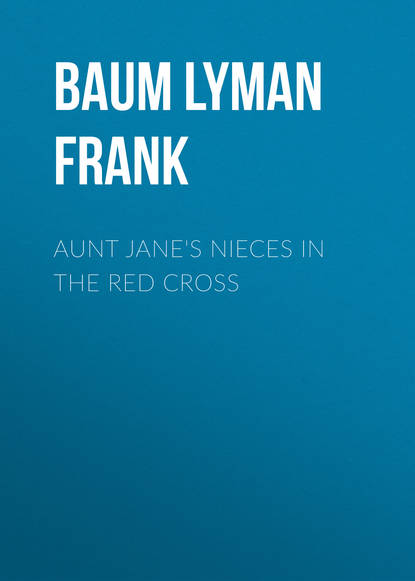По всем вопросам обращайтесь на: info@litportal.ru
(©) 2003-2025.
✖
Aunt Jane's Nieces in the Red Cross
Настройки чтения
Размер шрифта
Высота строк
Поля
"Did she find you in Dunkirk?" asked the girl.
"Almost, mamselle, but not quite. It was this way: I knew if I permitted her to follow me she would finally succeed in her quest, for she and the dear children have six eyes among them, while I have but two; so I reposed within an ash-barrel until they had passed on, and then I followed them, keeping well out of their sight. In that way I managed to escape. But it proved a hard task, for my Clarette is very persistent, as you may have noticed. So I decided I would be more safe upon the ship than upon the shore. She is not likely to seek me here, and in any event she floats better than she swims."
Patsy regarded the little man curiously.
"Did you not tell us, when first we met you, that you were heart-broken over the separation from your wife and children?" she inquired in severe tones.
"Yes, of course, mamselle; it was a good way to arouse your sympathy," he admitted with an air of pride. "I needed sympathy at that time, and my only fear was that you would find Clarette, as you threatened to do. Well," with a deep sigh, "you did find her. It was an unfriendly act, mamselle."
"They told us in Ostend that the husband of Clarette is a condemned spy, one who served both sides and proved false to each. The husband of Clarette is doomed to suffer death at the hands of the Germans or the Belgians, if either is able to discover him."
Maurie removed his cap and scratched the hair over his left ear reflectively.
"Ah, yes, the blacksmith!" said he. "I suspected that blacksmith fellow was not reliable."
"How many husbands has Clarette?"
"With the blacksmith, there are two of us," answered Maurie, brightly. "Doubtless there would be more if anything happened to me, for Clarette is very fascinating. When she divorced the blacksmith he was disconsolate, and threatened vengeance; so her life is quite occupied in avoiding her first husband and keeping track of her second, who is too kind-hearted to threaten her as the blacksmith did. I really admire Clarette – at a distance. She is positively charming when her mind is free from worry – and the children are asleep."
"Then you think," said Ajo, who was standing by and listening to Maurie's labored explanations, "that it is the blacksmith who is condemned as a spy, and not yourself?"
"I am quite sure of it. Am I not here, driving your ambulance and going boldly among the officers? If it is Jakob Maurie they wish, he is at hand to be arrested."
"But you are not Jakob Maurie."
The Belgian gave a start, but instantly recovering he answered with a smile:
"Then I must have mistaken my identity, monsieur. Perhaps you will tell me who I am?"
"Your wife called you 'Henri,'" said Patsy.
"Ah, yes; a pet name. I believe the blacksmith is named Henri, and poor Clarette is so accustomed to it that she calls me Henri when she wishes to be affectionate."
Patsy realized the folly of arguing with him.
"Maurie," said she, "or whatever your name may be, you have been faithful in your duty to us and we have no cause for complaint. But I believe you do not speak the truth, and that you are shifty and artful. I fear you will come to a bad end."
"Sometimes, mamselle," he replied, "I fear so myself. But, peste! why should we care? If it is the end, what matter whether it is good or bad?"
Watching their faces closely, he saw frank disapproval of his sentiments written thereon. It disturbed him somewhat that they did not choose to continue the conversation, so he said meekly:
"With your kind permission, I will now go below for a cup of coffee," and left them with a bow and a flourish of his cap. When he had gone Patsy said to Ajo:
"I don't believe there is any such person as the blacksmith."
"Nor I," was the boy's reply. "Both those children are living images of Maurie, who claims the blacksmith was their father. He's a crafty little fellow, that chauffeur of ours, and we must look out for him."
"If he is really a spy," continued the girl, after a brief period of thought, "I am amazed that he dared join our party and go directly to the front, where he is at any time likely to be recognized."
"Yes, that is certainly puzzling," returned Ajo. "And he's a brave little man, too, fearless of danger and reckless in exposing himself to shot and shell. Indeed, our Maurie is something of a mystery and the only thing I fully understand is his objection to Clarette's society."
At "le revue matin," as the girls called the first inspection of the morning, eight of their patients were found sufficiently recovered to be discharged. Some of these returned to their regiments and others were sent to their homes to await complete recovery. The hospital ship could accommodate ten more patients, so it was decided to make a trip to Dixmude, where an artillery engagement was raging, with the larger ambulance.
"I think I shall go to-day," announced Gys, who was wearing his mask. "Dr. Kelsey can look after the patients and it will do me good to get off the ship."
Uncle John looked at the doctor seriously.
"There is hard fighting, they say, in the Dixmude district. The Germans carried the British trenches yesterday, and to-day the Allies will try to retake them."
"I don't mind," returned the doctor, but he shuddered, nevertheless.
"Why don't you avoid the – the danger line?" suggested Mr. Merrick.
"A man can't run away from himself, sir; and perhaps you can understand the fascination I find in taunting the craven spirit within me."
"No, I can't understand it. But suit yourself."
"I shall drive," announced Maurie.
"You may be recognized," said Patsy warningly.
"Clarette will not be at the front, and on the way I shall be driving. Have you noticed how people scatter at the sound of our gong?"
"The authorities are watching for spies," asserted Ajo.
Maurie's face became solemn.
"Yes; of course. But – the blacksmith is not here, and," he added with assurance, "the badge of the Red Cross protects us from false accusations."
When they had gone Uncle John said thoughtfully to the girls:
"That remark about the Red Cross impressed me. If that fellow Maurie is really in danger of being arrested and shot, he has cleverly placed himself in the safest service in the world. He knows that none of our party is liable to be suspected of evil."
CHAPTER XVIII
A QUESTION OF LOYALTY
During the morning they were visited by a French official who came aboard in a government boat and asked to see Mr. Merrick.
The ship had been inspected several times by the commander of the port and the civil authorities, and its fame as a model hospital had spread over all Flanders. Some attempt had been made to place with the Americans the most important of the wounded – officers of high rank or those of social prominence and wealth – but Mr. Merrick and his aids were determined to show no partiality. They received the lowly and humble as well as the high and mighty and the only requisite for admission was an injury that demanded the care of good nurses and the skill of competent surgeons.
Uncle John knew the French general and greeted him warmly, for he appreciated his generous co-operation. But Beth had to be called in to interpret because her uncle knew so little of the native language.
First they paid a visit to the hospital section, where the patients were inspected. Then the register and records were carefully gone over and notes taken by the general's secretary. Finally they returned to the after-deck to review the convalescents who were lounging there in their cushioned deck-chairs.
"Where is the German, Lieutenant Elbl?" inquired the general, looking around with sudden suspicion.
"In the captain's room," replied Beth. "Would you like to see him?"

















